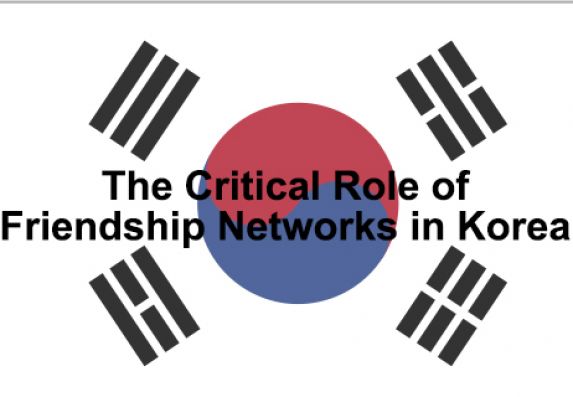Friendships are obviously important in all societies for business as well as for social reasons, but few people go as far as Koreans in their need and compulsion to develop and keep a network of chingu (cheen-goo) or friends.
The reason for this extraordinary phenomenon is that traditionally, Koreans could not depend upon anyone except people with whom they had close personal and family ties…basically for anything…often including services that local officials and bureaucrats were legally obliged to do for them. The obligations that family members had to each other and to their family as a whole virtually precluded them from establishing close relationships with more than a few outsiders.
In Korean culture, friendships entailed a number of obligations that went to a degree far beyond what was common in the Western world, and could have a seriously negative impact on the lives of both the individuals and their families. Outside contacts were therefore severely limited. Most Korean women spent their lives without ever speaking to, much less spending time with, anyone who was not a member of their family or close kin.
For one long period in the more recent history of Korea, women in urban areas could not leave their family compounds during the day to shop or pay social visits. They were allowed to leave their homes for a few hours only at night, during which time men were required by law to stay indoors to prevent them from intermingling with women who were not members of their family.
Korean men had a lot more freedom than women, but their relationships outside of their families and childhood friends were generally limited to a few men they met in bars and kisaeng (kee-sang) houses—Korean “geisha” houses*. They were not free to develop a circle of friends in the casual way that is common in Western countries because of the weight of the obligations that came with these friendships.
These social and political restrictions were officially abolished near the end of the 1800s as a result of Western influence, but it would take several decades before both men and women in Korea felt free to exercise the kind of personal freedoms Americans and others take for granted when it comes to friendships.
The legacy of the past continues to influence the behavior of Koreans when it comes to making and sustaining friends. Koreans, especially businesspeople and politicians, now go out of their way to develop and maintain a circle of friends because generally, they are able to get things done only with the help of friends …a point that foreigners in Korea need to be aware of.
Cold calls [an unsolicited visit or telephone call trying to sell goods or services] are still rare in Korea, and getting cooperation and/or help from people with whom you do not already have a close relationship is also rare.
It is strongly recommended that foreign businesspeople, diplomats and others who take up residence in Korea for any purpose quickly begin a planned campaign to develop and sustain friendships. They should do so with people in official and professional positions as well as with their contemporaries in age, education and occupation who have their own networks of friends.
These relationships are made and sustained in the same way that they are in the U.S. and elsewhere—through frequent meetings in bars and restaurants, doing favors for each other, giving gifts to individuals and to their wives and children on special occasions, participating in recreational activities with your peers, and so on.
By the 1970s, Korean businesspeople had also adopted the American custom of breakfast meetings, business luncheons, and inviting their Korean and foreign contacts to bars and nightclubs afterhours.
Nightclubs quickly became the most popular of these nighttime venues because they were staffed by some of the most beautiful and seductive women in the world…and like their Japanese counterparts, Korean businesspeople were skilled at cementing both friendships and business deals in that stimulating atmosphere.
***
*Koreans, not the Japanese, invented the institutionalized profession of using beautiful women to help them develop and maintain business and political relationships. The kisaeng of Korea predated the geisha of Japan by about one thousand years.












